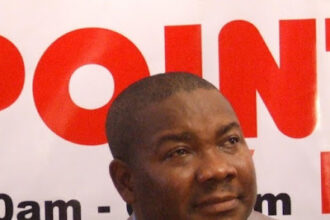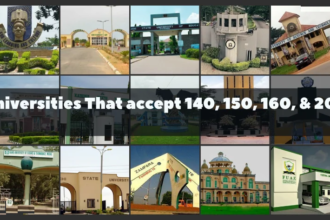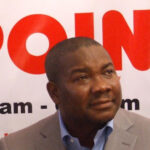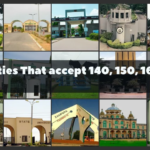CHAPTER ONE
1.1 INTRODUCTION
Social media have become a natural part of everyday lives of people all over the world. In the past few years, social media have shown a rapid growth of user counts and have been object of scientific analysis (Wigand et al., 2010; McAfee, 2006). For example, more than 800 million people worldwide are members of the facebook network (Facebook 2011) while twitter counts more than 200 million accounts in total (Huffpost Tech, 2011).
The arrival of these social media platforms have continued to change the way people communicate with one another around the world. For example, mobile phone penetration rates, in particular, have resulted in a plethora of ideas for new media platforms aimed at bridging the information divide between the well-connected and the disconnected (Unwin, 2012, p.7).
The place of social media on Nigeria’s electoral process is no longer in doubt. To advance the political conversation and mobilize political supports, down to reporting updates right from the polling boots on election day, social media has become a critical political tool for campaign planners. The 2011 general elections in Nigeria arguably marked a significant milestone in the use of social media for political communication in the country.
Even the Independent National Electoral Commission (INEC) and civil society organizations made extensive use of social media during 2011, 2015 and 2019 elections in Nigeria. This stakeholder used the social media to achieve a number of interrelated objectives.
Based on the foregoing, social media platforms have fundamentally aided political communication in Nigeria and has played a significant role in the success of any election held in Nigeria starting from 2011 till date.
Democracy is widely acknowledged as the best form of government in most parts of the world today.
Elections, which represent the most modern and universally accepted process through which individuals are chosen, represent a body or community in a larger entity or government is one of the cardinal features of democracy (Nnadozie, 2007).
This is so because in a democracy, the authority of the government derives from the consent of the governed. This is perhaps why democracy is commonly referred to as “the government of the people by the people and for the people”. Usually, a democratic election would characteristically be competitive, periodic, inclusive, definitive and free and fair (Chukwu, 2007).
THE ROLE OF SOCIAL MEDIA IN MOBILIZATION FOR ELECTORAL PARTICIPATION
The new media technologies have arguably enhanced the communication process in a wide range of human endeavours and the political environment no doubt is experiencing a great deal of the impact of new media phenomenon (Nwabueze & Ezebuenyi, 2002). However, the growing recognition and utilization of social media and their application in the political process underscore the role which social media have assumed in the world today.
In Nigeria for instance, the unwholesome reliance on godfatherism is gradually giving way to online tactical crafting and packaging of persuasive messages by campaign managers and political parties with an aim to consciously persuade Nigerian voters to vote in their candidates (Ezebuenyi & Ejezieh, 2012). The election campaign that saw Barrack Obama with the slogan “Change is possible”. Following the same trend, President Goodluck Jonathan also adopted an online information management skills in his 2011 presidential election campaigns and actually become the first in Nigeria to use such strategy that has increasingly made an inroad into our electoral process and in the overall political environment (Ezebuenyi & Ejezieh, 2012).
Social media are indispensable tools of satisfaction and conscientization in advancing political engagement and mobilization. The challenge of voter apathy which was experienced during the 2011 general elections in some parts of the country can be averted in future elections through the optimal utilization of new social media platforms. The governments at all levels through its agencies and the politicians can spread political messages directly to citizens mobile phones to encourage them to vote in particular ways.
CHAPTER TWO
2.1 INFLUENCE OF SOCIAL MEDIA ON 2011 GENERAL ELECTIONS
According to Okoro and Nwafor (2013 p.35) Since 2008 when Barrack Obama broke new ground by using social media in his political campaigns in ways never seen before, many Nations and politicians have continued to toe along this line. Nigeria had her first real test of social media use for political purpose during the 2001 general elections.
The new technology played an unprecedented role in the April 2011 Nigerian General Elections. INEC (Independent Electoral Commission) officials had in early March 2011 welcomed the assistance of civil society volunteers with its facebook and twitter accounts as well as new media situation room which received feedback from the public and later began to provide real time information and answered constituent questions. (Okoro & Nwafor 2013).
Adibe, Odoemelam and Orji (2012) observed that during the elections in Nigeria, many Nigerians were armed with their blackberries and twitter feeds. One of such Nigerians was Gbenga, a 33 years old IT consultant and an activist. His team had designed a smartphone application called Revoda which allowed voters to instantly upload reports of delayed voting materials and intimidating gangs at their local polling stations to their database, a daily summary was then sent to Nigerian election officials and western observers as well as posted on their Revoda website, this allowed many people within and outside Nigeria to follow the process.
Omenugha (2011) observed that the massive use of social media culminated in the success of the election acclaimed the freest and fairest in the history of the country.
2.2 SOCIAL MEDIA BREAKTHROUGH IN 2011 GENERAL ELECTIONS
Udejinta (2011) observed that “one remarkable thing about the 2011 general elections was the adoption of social media especially the facebook by the politicians, the political parties and the electorates as a platform for political participation”. The relevance attached to social media in the 2011 general elections was better explained by President Goodluck Jonathan decision to declare his intention to run for the highest political officie in the land on facebook.
According to Okoro (2013 p.30) Jonathan had on Wednesday, September 15, 2010 informed his 217,000 fans on the world’s most popular networking platform (facebook) of his intent. 24 hours later, more 4,000 fans joined his page and by the day of the election, he had over half a million followers. His closest rivals – Alhaji Mohammed Buhari of the CPC, Nuhu Ribadu of the CAN and Alhaji Shakarau of the ANPP were also among those that made heavy presence on facebook and other social media platforms. In addition to the approximately 3 million registered Nigerians on facebook and 60,000 on Twitter, almost every institution involved in Nigeria’s elections conducted an aggressive social networking outreach, including the Independent National Electoral Commission (INEC) political parties, candidates, media houses, civil society groups and even the police (Adibe, Odoemelam and Chibuwe 2011).
RECOMMENDED: FEMALE PANT THEFT AND MONEY RITUALS
2.3 THE ROLE OF SOCIAL MEDIA ON 2019 ELECTIONS
According to Akinnaso (2018), it is particularly important to monitor but without gagging, social media usage in Nigeria from now through the general election because of the porous nature of Nigeria’s political space and incoherent nature of the nation’s security architecture, with security officers looking away while crime is being committed.
Akinnaso continued in saying, all the candidates of major and minor political parties have taken to social media in their bid to woo supporters. This is particularly true of President Muhammadu Buhari of the All Progressive Congress and former Vice president Atiku Abubakar of the Peoples Democratic Party. The restructuring debate and Buhari’s fitness for office have featured on their social media platforms, especially facebook.
Among all the social media platforms, twitter formidably stood out in terms of general engagement, with memes, videos, gifs and infographics were mostly being used in conversations by users. Polls on the platform were also heavily used by influencers and regular users to determine the political convictions of Nigerians as well as the personal perceptions of the presidential candidates.
CHAPTER THREE
3.1 ROLE OF SOCIAL MEDIA IN POLITICAL AWARENESS
According to Ayeni (2019) in a modern democracy, social media can be used by governments to involve citizens in decision making and by civil society to engage people in specific issues. However social media can also be used to broaden political participation by helping citizens to communicate with their representatives and with each other. The use of social media as a formidable force for social engineering and political electioneering has continued to grow. The technology is participatory, interactive and cost-effective. This has made it the medium of the moment as far as political communication and participation are concerned. (Ayeni 2019, p. 33). Ayeni continues in saying “The role of youth in electoral activities cannot be over emphasized, they play active role in mobilizing support for candidates and actual voting. They are the active participants of election violence and also the active users of social media”.
3.2 CONCLUSION
It is not in doubt that the primary function of social media which comprises, Facebook, Twitter, Whatsapp, Instagram, Youtube and so on are to connect people through interactive computer-mediated platforms so they can share information. In the process, social networks are created, some temporarily and others permanently, often for specific purposes.
One of the major uses of social media in recent years is the mediation of the political process and discourse. Political narrative have particularly gained momentum in Nigeria through the various platforms of the social media.
The proliferation of social media were visibly seen in Nigeria’s presidential and gubernatorial elections from 2011 to 2019 and their influence were not in doubt as the various candidates extensively engaged their supporter via the social media platforms to win their supports. The advantage of social media for them lies in the opportunity of direct communication with supporters, by side tracking regulated mainstream media such as radio, television, newspapers and magazines as well as press conferences. By so doing, issues raised mainstream media and on political campaigns are subjected to discussion and repackaged in new light on social media.
3.3 RECOMMENDATION
Learned users of social media, especially bloggers, should guide discussions on their platforms towards informed debate of issues by offering clarifications and suggestions. Extremists should be gagged and extreme measures, such as an obnoxious social media Bill once proposed by the National Assembly, should be completely avoided. The value to free debate offered by social media should be protected.
Candidates for political office and their supporters should refrain from using inflammatory rhetoric and disseminating false information on social media. For example, the soon-to-die fabrications, emanating from some supporters of former President Goodluck Jonathan against candidate Muhammadu Buhari in 2015 should be completely avoided. Again, Public Education should be aired on radio, TV and Social media during election campaigns.
According Akinnaso (2018) social media should not be used to spread false information, or should they be used to incite people against particular candidates or their parties or to inspire violent acts. Not only are such uses dangerous, they detract from the democratic tradition. The focus should be on how social media could be used to enhance our democracy and improve our electoral processes.
REFERENCES
Ezebuenyi E. E. & Ejezieh, L. N. (2012). “The Mass Media, Political Advertising and Nigerian Voters: An Appraisal”. 1st International Conference of the Department of English, Anambra State University, Igbariam Campus, pp. 283-291.
Huffpost Tech (2011). Twitter: We now have over 200 million accounts (update). Retrieved from http://www.huffingtonpost.com/2011/04/28/twitter-number-of-users-n-855177.html
Nwabueze, C.D & Ezebuenyi, E.E. (2012). Appraising the relevance of ICTs in Awareness Creation during Election. Journal of Linguistics and Communication Studies, 2(1), 293-302.
Okoro, N. & Nwafor, K.K. (2013). Social Media and Political Participation in Nigeria during the 2011 general elections: the lapses and the lessons. Global J. Arts Humanities Soc. Sci, 1: 29-46.
Matuszka, T. Z & S. Laki (2013). On Keyword- Lifecycle model of real-time event direction in social network data. Proceedings of the 2013 IEEE 4th International Conference on Cognitive Infocommunications. ISBN: 978-1-4799-1546-3, pp: 453-458.
Song, M. & Kim, M.C. & Jeong Y.K. (2014). Analyzing the political landscape of 2012 Korean Presidential election in Twitter. IEEE Intell. Syst, 29:18-26.
Stiglitz, S. & Brockmann & Xvan, L. D. (2012). Usage of social media for political communication. Proceedings of the 16th Pacific Asia Conference on Information Systems, July 11-15, 2012, AIS Electronic Library, Hochiminh City, Vietnam, pp:1-12.
Tang, T., Hamalainen, A. Virolainen & Makkenen J. (2011). Understanding user behaviour in a local social media platform by social network analysis. Proceedings of the 15th International Academic MindTrek conference on Envisioning future media Environments, September 28-30, 2011, Acm, Tampere, Finland, ISBN: 978-1-4503-0816-8, pp: 183-188.
Adibe, Odoemelam & Orji (2012). Social media and political participation in Africa: Issues, problems and prospects. Paper presented at the ACCE, FUT Minna, November 2012.
Mayfield (2008). Is blogging innovation journalism? http://www.innovation journalism.org/archive/INJOBaltaziz.pdf
Allen, Ekwugha & Chukwulete (2011). An assessment of the readership base for Nigerian blog. Paper presented at the ACCE, Covenant University, Ota. September 2011.
Omenugha, K. A. & Ukwueze, C. (2011). First Ladies political marketers: A study of Dame Patience Jonathan’s women for change initiative. Paper presented at the ACCE, Convenant University, Ota. September, 2011.
Ayeni, T.P. (2019). The Role of Social Media in Voter Sensitization in Nigeria. Retrieved from http://www.1medpub.com
Wigand, R. T., Wood, J. D & Mande, D. M. (2010). Taming the social network jungle: from web 2.0 to social media. In: Proceedings of the America’s conference on information system. Paper 416.
Nnadozie, U. (2007). History of Elections in Nigeria. In Attahiru Jega and Oke, I. (Eds). Elections and the future of democracy in Nigeria. Nigeria: Nigerian Political Association.
Chukwu, P. (2007). The 1999 constitution and the Independent National Electoral Commission (INEC): Prospects for impartial supervision and conduct of elections. In Jega Attahiru and Oke, I. (Eds.) Elections and the future of democracy in Nigeria. Nigeria: Nigerian Political Association.
Chatora, A. (2012). Encouraging political participation in Africa: The potentials of social media platforms. Google search http://www.role of social media in encouraging political participation in Africa.






